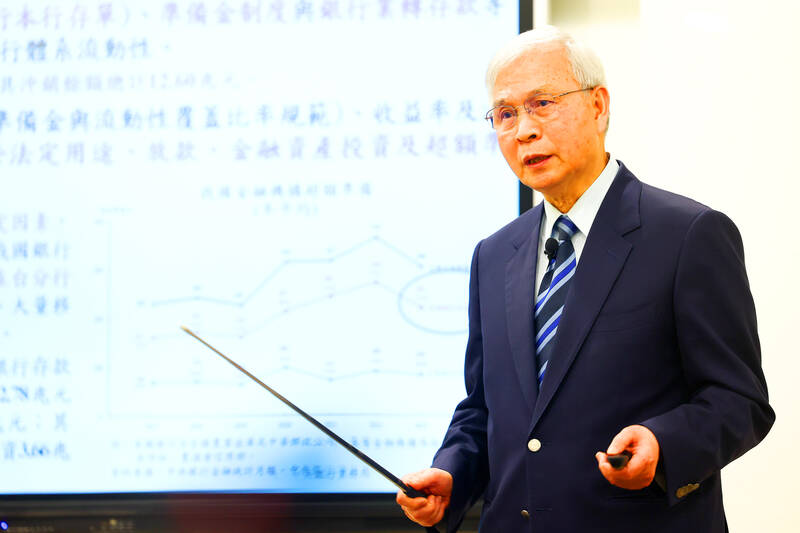The central bank’s board members in September agreed to tighten lending terms to induce a soft landing in the housing market, although some raised doubts that they would achieve the intended effect, the meeting’s minutes released yesterday showed.
The central bank on Sept. 18 introduced harsher loan restrictions for mortgages across Taiwan in the hope of curbing housing speculation and hoarding that could create a bubble and threaten the financial system’s stability.
Toward the aim, it cut the loan-to-value ratio by 10 percent for second and subsequent home mortgages and denied grace periods for first mortgages if applicants already owned other residential properties.

Photo: CNA
One board director said that some people have taken advantage of the grace periods — when borrowers need only pay interest — and resold properties for profit before the grace periods expired, the minutes showed.
The director panned the practice, calling it short-term speculation that has contributed to increases in home prices — making owning a home increasingly unaffordable for people with real demand.
The director said that more forceful measures should be introduced to rein in housing credit, warning that a reversal in housing prices or a hard landing could hurt Taiwan’s financial stability.
First-time mortgage applicants who own multiple residential properties account for nearly 20 percent of applications, the central bank said.
The central bank later backed off and allowed inheritors to qualify for grace periods.
It also removed credit controls for people who have inked home purchase agreements, but have not yet secured bank loans, and for people who need to relocate for family and working reasons, as long as they sell their prior homes within a year.
Another board director said that the latest credit controls were harsher and more expansive, as they extend nationwide, rather than being restricted to the six special municipalities, as well as Hsinchu city and county, the minutes showed.
However, the success of the credit controls remain to be seen, the director said, as not all people in Taiwan need bank credit to advance their property investment plans.
Another board director pressed the central bank to remain watchful for inflation given that house rents continue to rise, with the hikes partly reflecting house price trends.
An increase in interest rates promised a better solution than tightening banks’ required reserve ratios in cooling the housing market, the director said.

POWERING UP: PSUs for AI servers made up about 50% of Delta’s total server PSU revenue during the first three quarters of last year, the company said Power supply and electronic components maker Delta Electronics Inc (台達電) reported record-high revenue of NT$161.61 billion (US$5.11 billion) for last quarter and said it remains positive about this quarter. Last quarter’s figure was up 7.6 percent from the previous quarter and 41.51 percent higher than a year earlier, and largely in line with Yuanta Securities Investment Consulting Co’s (元大投顧) forecast of NT$160 billion. Delta’s annual revenue last year rose 31.76 percent year-on-year to NT$554.89 billion, also a record high for the company. Its strong performance reflected continued demand for high-performance power solutions and advanced liquid-cooling products used in artificial intelligence (AI) data centers,

SIZE MATTERS: TSMC started phasing out 8-inch wafer production last year, while Samsung is more aggressively retiring 8-inch capacity, TrendForce said Chipmakers are expected to raise prices of 8-inch wafers by up to 20 percent this year on concern over supply constraints as major contract chipmakers Taiwan Semiconductor Manufacturing Co (TSMC, 台積電) and Samsung Electronics Co gradually retire less advanced wafer capacity, TrendForce Corp (集邦科技) said yesterday. It is the first significant across-the-board price hike since a global semiconductor correction in 2023, the Taipei-based market researcher said in a report. Global 8-inch wafer capacity slid 0.3 percent year-on-year last year, although 8-inch wafer prices still hovered at relatively stable levels throughout the year, TrendForce said. The downward trend is expected to continue this year,

Vincent Wei led fellow Singaporean farmers around an empty Malaysian plot, laying out plans for a greenhouse and rows of leafy vegetables. What he pitched was not just space for crops, but a lifeline for growers struggling to make ends meet in a city-state with high prices and little vacant land. The future agriculture hub is part of a joint special economic zone launched last year by the two neighbors, expected to cost US$123 million and produce 10,000 tonnes of fresh produce annually. It is attracting Singaporean farmers with promises of cheaper land, labor and energy just over the border.

A proposed billionaires’ tax in California has ignited a political uproar in Silicon Valley, with tech titans threatening to leave the state while California Governor Gavin Newsom of the Democratic Party maneuvers to defeat a levy that he fears would lead to an exodus of wealth. A technology mecca, California has more billionaires than any other US state — a few hundred, by some estimates. About half its personal income tax revenue, a financial backbone in the nearly US$350 billion budget, comes from the top 1 percent of earners. A large healthcare union is attempting to place a proposal before